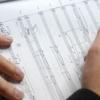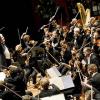Search the Community
Showing results for tags 'contemporary'.
-
This is a piece I would really like to transpose with more strings and entire orchestra..but for now it remains written for 7 string guitars in B flat. Sheet music for each individual instrument is unfortunately in each single pdf. Sorry. Also, please forgive the midi sound haha. Feedback is much appreciated!Mark My Face.mp3
- 2 replies
-
- metal
- contemporary
-
(and 1 more)
Tagged with:
-
This piece was originally written on my 6 string guitar in C#. I managed to get a nice sound out of the grand piano in Reason. I am still working on fixing the velocity to give the piano a more realistic and human feel. I love this though, it's fast, energetic, innovative and really a breath of fresh air to write.
- 20 replies
-
- piano
- contemporary
-
(and 1 more)
Tagged with:
-
This little piece uses different contemporary techniques such us random dynamics, interval set, dodecaphonic scales, etc..., in a counterpoint background including canon (octava, motu contrario, prolation).
- 2 replies
-
- rondo
- pitch class set
-
(and 4 more)
Tagged with:
-
Two improvisations I recorded yesterday. They are contrasting (in my opinion) - let me know what you think! I recommend listening to the "Soft" one first. Soft.MP3 Hard.MP3
- 3 replies
-
- improvisation
- impressionism
-
(and 5 more)
Tagged with:
-
Hey everyone! Please let me share a newly recorded version of my composition "The Sea". Don't know If this is the right place for it, but it's a guitar composition so I thought It would fit well in the chamber music althought it's not a typical chamber music piece. There's a nice story behind this, I was at the summer vacation in Croatia and I once brought my guitar to the beach with me, it was in the late evening and the beach was all empty. And while I was listening to the waves and playing some harmonies that had the "sea feel" to me, a family of strangers sat so near to me as If they wanted to listen to my playing while watching the sea. After a while they left and so I thought that maybe they didn't like it, but they soon came back to the exactly same place near to me with a blanket and stayed there until I left. So I thought If they like it, I should make a composition out of what I was playing and this is it. It's played by me and the waves in the background are recorded in Ireland by my friend. I hope you'll enjoy! :)
- 8 replies
-
- classical
- soundtrack
-
(and 2 more)
Tagged with:
-
hope you like it.
-
Hi everyone! This is another composition I wrote for solo piano. It's called Ballerina and I wrote the main theme in early 2013,but I didn't finish the piece until the late 2014. When it comes to the style I think it's got elements of romanticism and contemporary piano music. Judging of this is up to you guys,please let me know what you think :) There's a nice story behind this video. Peter Nagy- a legend of Slovak popmusic,great singer/songwriter and a great photographer came up with the idea of paying tribute to a talented young Japanese ballet dancer Aya Watanabe, he made a few photos of her and asked me for my permission to use my piece Ballerina for this video and It was a real pleasure for me so obviously I agreed :) He liked the piece very much and so I hope you will too! Any criticisms are welcome of course!
- 2 replies
-
- solo piano
- romanticism
-
(and 2 more)
Tagged with:
-
Hi everyone! This is a piano piece from my debut EP and It's called "Impression". Althought I'm not very good at determining certain styles,I think it has elements of contemporary piano music and impressionism. I recorded it by myself. Please let me know how you like it!
- 2 replies
-
- impressionism
- contemporary
-
(and 2 more)
Tagged with:
-
As I slowly upload everything again, I bring my largest work up-to-date, my second symphony. It is in four movements and lasts about 25 minutes. It was composed in 2008 for the 50th anniversary of Slovene radio symphony orchestra and was selected by artistic advisors of the orchestra to be performed throughout 2008/09 season. So premiere took place on 23rd April 2009. I adopted some formal approach which is characteristic to late-romantic symphonies - frequent use of the basic motif throughout other movements, rich and colourful orchestration, free contemporary music language which uses different techniques at the same time: tonality vs atonality, aleatorics vs clear pulsation - clear melodies vs aleatoric counterpoint. I wish you pleasant listening!
-
Hi everyone , I have any question :) . Firstly my English is very bad. So I'm sorry . I'm composition student at university and I have scholarship but my class is preparation . My Professor and my friend says my compositions very good but I'm writing tonal music but I cant write contemporary music . example : I cant write Whole tone music or I cant write like Stravinsky . What can I do ? I want to write contemporary music , whole tone and like stravinsky . My Professor said that so early but my other Professor said that you can start contemporary . What can I do ? :) Thak you . I'm sorry for my english is very bad.
- 4 replies
-
- composition
- contemporary
-
(and 2 more)
Tagged with:
-
Hello, I am studying composition at a university and one of my optative subjects is "Musical Sociology". For that subject I am writing a short paper about the accessibility of contemporary music. More specifically, I am studying the hypothesis that two elements, form and musical discourse, are more important than the musical language used in a given work in determining it's accessibility. For anyone interested in helping I have, at the moment, two questions. The first is: among contemporary works written using non tonal idioms, which would you consider to be more accessible, and why? I also ask the opposite question regarding works written in a more traditional tonal idiom. Which of those « works would you consider to be less accessible, and why? Thanks for the help, and sorry for any mistakes.
- 25 replies
-
- sociology
- contemporary
-
(and 6 more)
Tagged with:
-
Hey all again! I haven't been here for a long time... :) I have a new competition idea for you, but not sure, if anybody would be interested.. At least maybe I start your brain for today :D In February, I bought my electric cello (yamaha svc-110). I use it mainly in my rock band, and some jazzy stuff, but now I decided to write a piece for electric cello and tape. I would like to write it and perform it during the winter. Of course that wouldn't be the only piece, what I would play on that concert, and that's why I'm writing to you, guys! So if you really feel like you want to write a work for electric cello, please go for it! It's a beautiful instrument, with a very cello-like sound, but with so many possibilities. About the instrument I think I need to write some details about the instrument. Using an electric cello without anything else would be quite boring and stupid, so I have 2 pedal systems: Line 6 POD HD500 is my effect processor, and BOSS GT-100 is my loop station. With the effect processor, I can have plenty of effects like delay, distortion, reverb, transposing, filters, phaser etc etc etc... so what electric guitars have. You can connect 8 effects, so you can have delay and distortion in the same time. I can attach a pedal touching for each effect, so I can turn them on and off individually. It can have stereo sounding too, so you can make different effects on each side. I know that this is not enough information, but if you're interested, you can check the electric guitar effects on the internet, and you will find a lot. You can use them. Or for example you can say in the score that "I would like to have here a mysterious sound" or "Please add here a strange effect, what makes the audience wake up". So trust me, I can help, you just need to make a good question :) The Boss pedal is a loop station, so I can record there (to 3 separated tracks - we can synchronize them, but that's not a must, they can have independent tempo, timing), and it repeats as long as I want. You can delete the whole track, or you can stop them, fading out, or immediately. Also there is a "stop/start everything" pedal, which is very nice - an immediate silence is always a nice thing. It has some effects too, but very bad ones, I don't use them. About the pedals (mainly the Line 6 one) you need to know, that pushing a pedal has a noise, so count with that. (on the recording you won't here, but life it can be audible in the first 3-4 rows. You can compose it in the work, if you want! :) The cello itself is really like a normal acoustic cello, just it doesn't have the body, and works with battery. :D About the works I would like to play With the loop station, it's quite easy to write and play 'popish' music. You can also write some meditation music, with the loop station, sustained notes repeated, for example. Check youtube for some ideas, if you don't know, how looping works, there are many videos. Of course I would be very happy to play some contemporary classical music on the electric cello, and that would be the main aim. I would prefer a work for solo electric cello, or cello with recorded accompaniment, as I don't really have an other musician, to play together with... :/ It may be possible, that I can record the accompaniment, if you want to use the Steve Reich technique. The most important thing: the work should be for electric cello. You can rewrite your solo acoustic cello works if you want, but changing the title is not enough for me. I would like to see some effects, new ideas, creative things. One other, but very important thing: I'm still not a professional cello player. You can write complicated things, but not very very complicated, I don't really have time to practice a lot. Please excuse me for it! What I can give The works I like the most I will perform (sooner or later). I would like to have some solo concerts until spring, because organizing a solo concert is much easier, than anything else. Also I can make recording in my home studio if you want, is less work, then playing on a concert. :D If you have any questions, please don't be shy! And you can write it here, to help the others. Also if you're interested, please write! I would like to know, if anybody is thinking about my idiot ideas :D My e-mail address: gollam12@gmail.com. Please use the subject option in the mails, because I get many emails during one day, and I don't want to miss any of yours! Good luck, have fun! Marcell Magyari
- 5 replies
-
- 1
-

-
- electric cello
- solo
-
(and 2 more)
Tagged with:
-
Hello all! I would like to have a concert in 2012 October-November, which would be a solo cello concert. I will play pieces like Penderecki's Capriccio, and Ligeti Solo Sonata. On this concert, I would like to perform one of your pieces, so that's the reason for this competition. You can write for cello solo, or cello with electronic accompaniment (or other prerecorded staff). I prefer more xx. century or contemporary staff on this concert, so neo-classic and neo-romantic pieces won't be really accepted. The piece doesn't have to be new, but I like to be the world premiere cellist :) You have to send the (full) score to my e-mail --> gollam12@gmail.com I hope till June 1st everybody can do something for this small competition. Of course is somebody needs more time, it can be extended. Please write a comment, if you want to try this, so that I can see how many people will try. Also, if you have any questions, write it here, or write PM. Cheers, Marcell Magyari
- 35 replies
-
- 3
-

-
- solo cello
- competition
-
(and 1 more)
Tagged with:
-
This is a thought that has nagged at me for years now, ever since I started to compose. Let me make it clear, I am not referring to what forms are available on a larger scale (e.g. Concerto, Sting Quartet and so on), nor do I mean how do we handle and develop our themes and ideas – all be this closer to what I mean. I am referring specifically to our use of form and its originality. For example if I say ‘Sonata form’ or ‘Scherzo’, immediately one conjures up a preconception of an inner form – a ‘middle-ground’ form perhaps, if we were to borrow a term from Schenker. Taking a sonata for example, the inner form using the most basic model would be: Exposition (AB-codetta), Development (A’B’), and Recapitulation (AB-coda). However, such middle-ground structures and their subsequent tonal implications seem unsatisfactory in contemporary composition. So, how on this level should we structure music? Obviously some forms are tied to their preconceptions more so than others, the Scherzo for example is little more than a name nowadays rather than form set in stone. On the other hand the sonata despite its many permutations is still a sonata; it is still tied to the concepts of exposition, development, and recapitulation no matter how blurred the boundaries are. Staying strictly within the realms of ‘absolute music’, – i.e. music with no extra-musical connotations such as the tone poem, or other music in which a narrative governs its structure – if the sonata as a form is redundant in 21st century what do we replace it with? As soon as we say this, a whole world of possible alternatives to the sonata opens up. Unfortunately many, (though for different reasons) seem equally unsatisfactory as the sonata. For example, opening a concerto with a (strict) fugue would probably be unsustainable. Using an essentially made up form e.g. ABABACDEBA, lacks the academic rigour required in contemporary composition – at least in this ‘middle-ground’. We could develop forms based upon mathematical principals such as the Golden Ratio, but this is more of an overall form (like the scherzo) and so would leave questions regarding thematic coherence relative to the structure. In short I am at a loss, any suggestions? J
-
Greetings to all fellow composers! For some bizarre and peculiar reason, we are living in an age where people are becoming obsessed with thinking that we have to label every single compositional style that composers write in. I was reading a book by the australian composer Andrew Ford (it was called "Illegal Harmonies") about modern music since 1900 and I was amazed to see that the glossary of musical styles (Impressionism, futurism etc.) went on for about 50 pages! I don't really see the need to label music in this way as the words hardly help anyone just listen to the music and the sounds created.In my opinion, all of these words that we apply to different styles of modern classical music are absolutely meaningless. To show you what I mean I'll use the labels "Impressionism" and "minimalism" as examples. Impressionism is a word used when describing the style of painting that was around in France in the late 1800s and early 1900s. This style was influenced by the effect that light had on certain objects and places; often artists would paint the same object/landscape with different lightings to create very different images (Monet has done some good examples of this). Now, what musicologists and whatever have done with this word is this: they have used it to describe the music by the French composers Debussy, Ravel, Satie and several others. The thing that doesn't make sense is that in order to make the music go with this label means that he music has to take the features of impressionist painting (the effect of light on objects and places) and apply them to the music (which would therefore sound completely different). Even thought Debussy has written music that happens to have titles that you would imagine you'd find on a painting by Monet (e.g 'The Sunken Cathedral') it techincally is NOT genuine impressionism. In the long run, Debussy hated the term anyway. Minimalism is a term that is used to describe the fine arts that has very little or no diversity when it comes to the art elements (colour, shape, form, tone, line, space and texture). Musicologists have taken this word and stupidly applied it to the music of composers such as Philip Glass and John Adams. A lot of the works by these so called "minimalist" composers are bursting with colour and harmonies that you would not expect from an artist like Carl Andre. The only thing that someone would say that is "minimal" about their music is the lack of motific development. If I let a six-year-old listen to the first movement of Glass' first violin concerto or Adams' "A Short Ride In A Fast Machine" and asked them to describe the music they just heard, the word "minimal" would pretty much definitely not occur. In the long run, Glass and Adams (just like Debussy with "impressionism") they hated the term anyway.




